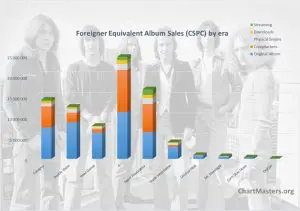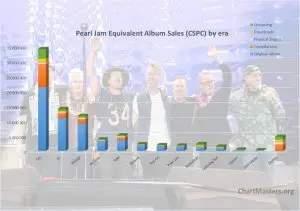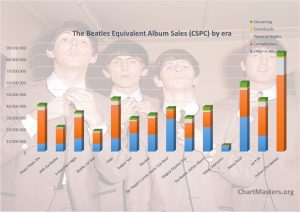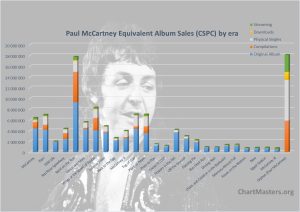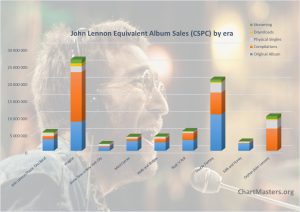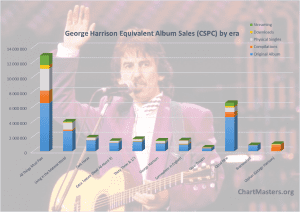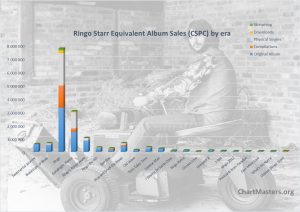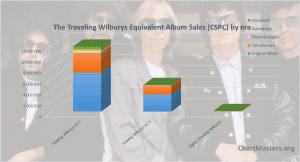Deep Purple albums and songs sales
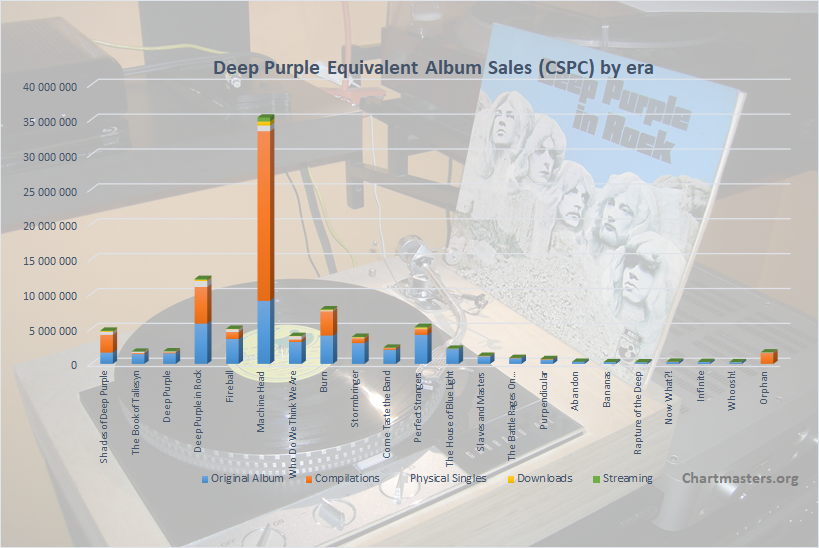
Part of the legendary “Unholy Trinity of British Hard Rock and Heavy Metal” along with Led Zeppelin and Black Sabbath, Deep Purple helped introduce and style, Hard Rock and Heavy Metal in the early 70s.
Active to this day, the general public remembers them best for Smoke On The Water, a song often listed along with the likes of Whole Lotta Love and Back In Black in best guitar riffs of all-time lists.
Unlike these other bands though, their certified sales are very low, which has led to various myths floating around for decades.
At last, we can enlighten on this mystery. Take your seat and let’s delve into the murky world that is, Deep Purples worldwide sales.
Deep Purple was formed in 1968 and included Ritchie Blackmore (guitar), Jon Lord (keyboards), Nick Simper (bass), Rod Evans (vocals), and Ian Paice (drums).
This line up went on to release 3 progressive rock LPs in 68 and 69, with marginal success, mainly in North America where Hush hit #4 in the US and #2 in Canada.
By the time of their eponymous third release, the future wasn’t looking too bright, but Blackmore upon seeing and hearing Led Zeppelin, decided heavy was the way forward for Purple.
The line-up was duly adjusted to include the vocally superior Ian Gillan (replacing Evans) on vocals, with his Episode 6 band mate, Roger Glover (replacing Simper) on bass.
The metamorphosis was complete and resulted in the genre defining classic, Deep Purple In Rock. The album kicked off their golden MKII years, easily their most renowned and respected era. Further success would come with Fireball, there first UK #1 and Machine Head, which due to it’s US success, is probably held as their most iconic album.
The band quite simply exploded in the USA, in 1972 and 1973. mainly on the back of their live performances, which in turn led to the success of Machine Head, Made In Japan and Who Do We Think We Are, on the Billboard 200 album chart.
Their albums performed so well across 1973, that in the yearly Billboard awards, they were named #1 album artist. Behind the scenes though, Gillan had handed in his notice and Glover was asked to leave, at the behest of a cowardly Blackmore.
Blackmores preference for a new singer was someone who could sing the blues, Paul Rodgers being his favoured choice. Unfortunately for Blackmore, Rodgers had committed himself to a new project called Bad Company.
A long fruitless search and a Melody Maker ad for a new singer, resulted in the appointment of David Coverdale, an unknown singer from Redcar. A guy who’d sent a drunken cassette recording, in reply to the ad. Prior to this Glenn Hughes, from the band Trapeze, had been snapped up to play Bass and provide backing and shared vocals, with Coverdale.
While Burn was a roaring success, going Top 10 in nearly every country it charted, Stormbringer saw a decline in sales and positions achieved and also the departure of Blackmore, who was annoyed with the soulful and funky direction the band had taken. Come Taste the Band, with Tommy Bolin, replacing Blackmore, saw a further decline in sales, with many not accepting the change in sound, but more importantly the departure of Blackmore.
Blackmore left to form the band Rainbow, even bringing in Glover, at one point. Coverdale quit and went solo, before creating Whitesnake, a band that would also included Paice and Lord.
No less than three former Deep Purple or Rainbow singers went on to become Black Sabbath lead singer, Gillan, Hughes and Ronnie James Dio.
Joe Lynn Turner and Don Airey have been members of several of these bands too.
In the meantime, the group always continued to release new material and tour, except during one hiatus which lasted from 1976 to 1984.
The various line-ups, known as Mark I to Mark VIII, are part of the reason their sales remain so unclear.
Historically, labels often claimed sales for groups not as one act, but as the sum of its members.
That way, even sales of bands founded by former Deep Purple members like Rainbow and Whitesnake can be seen as Deep Purple sales.
From the 7.5 million RIAA certified units to the 150 million often claimed these days, the gap is wild. Band members are in the dark as well, with Paice famously joking they sold “More than 10 and less than 500 million”.
So, where is the truth? It’s time to get some answers!
As usual, I’ll be using the Commensurate Sales to Popularity Concept in order to relevantly gauge their results. This concept will not only bring you sales information for all Deep Purple albums, physical and download singles, as well as audio and video streaming. In fact, it will also determine their true popularity.
If you are not yet familiar with the CSPC method, below is a nice and short video of explanations. I fully recommend watching it before getting into the sales figures. Of course, if you are a regular visitor feel free to skip the video and get into the numbers directly.
The Commensurate Sales to Popularity Concept (CSPC)
There are two ways to understand this revolutionary concept. In the first place, there is this Scribe video posted below. If you are unaware of the CSPC method, you will get the full idea within just a pair of minutes.
If you are a mathematical person, and want to know the full method as well as formulas, you can read the full introduction article.
Now let’s get into the artist’s sales figures in detail in order to apply this concept and define the act’s true popularity!
Deep Purple Album Sales

Original Album Sales – Comments
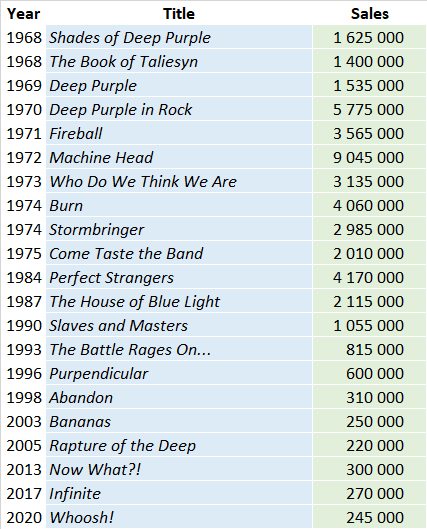
The career of Deep Purple took a while to really take off. The frequent line-up changes also meant that newly gained fans, through the years, wouldn’t always look for all their previous records.
With this in mind, we understand the modest sales of their first 3 albums, although they still moved about 1.5 million each.
While they remained weak sellers in the US, In Rock saw them become blockbusters across Europe. It was, for example, a 3-months #1 and 13-months top 10 album in Germany.
Low markets at the time meant it didn’t sell the immense numbers, a similar run in later decades would see, yet with catalog sales it reaches the healthy total of 5.78 million units.
Fireball, just like later albums Who Do You Think We Are, Burn and Stormbringer were great sellers, surfing their hey-days wave perfectly, although without hits as big as Child In Time or Smoke On The Water.
It leds them to 3 million plus sales a piece, with Burn leading the way.
In-between, of course, Machine Head was released. The classic, home of songs like Smoke On The Water and Highway Star, is up to 9 million sales globally.
At 2 million, sales of Come Taste the Band weren’t awful but it was an obvious step down for the band, who were on the verge of splitting up, mainly due to Hughes and Bolins heavy drug use. Coverdale quit after the final gig of the tour in Liverpool, at which point Lord and Paice decided to fold the group completely. This in all regards, was intended as the end for Deep Purple.
But only 8 years later, the classic and most loved Mark II line-up, from the years 1969-1973, decided to return and in doing so produced another hit album.
Perfect Strangers, helped by the success of the title track, moved over 4 million units.
The following years haven’t been as good, with sales collapsing album after album, until falling to 310,000 with 1998’s Abandon.
During the last two decades, in spite of the market changes, they managed to retain similar sales with each new release.
Deep Purple Songs Sales

Physical Singles

As a reminder, the weighting is done with a 10 to 3 ratio between one album and one physical single.
The top 5 US hit Hush sold close to a million there, with sales moving over this mark thanks to purchases from elsewhere.
The success slowed down considerably over the next few months, although Kentucky Woman still sold nearly half a million, but Emmaretta shifted only 145,000.
Their true global blockbuster arrived in 1970. Black Night, unreleased in the US, was #1 in multiple markets while peaking at #2 in the UK and Germany.
With about half a million sales in each of these two markets, on top of heavy successes in Latin America and Japan, the track closes counts at 2.32 million sales.
Issued as a stand-alone song at first, Black Night wasn’t the main support of In Rock‘s success, instead, Child In Time was.
This song wasn’t issued as a single in most markets though, which explains the low sales. These were achieved in specific markets like the Netherlands, Belgium, Turkey or Poland.
Both Fireball and Strange Kind of Woman sold well, over half a million each, in the same markets as Black Night.
Half of their units come from the UK and Germany and the other half mainly from the rest of Europe, Japan and Latin America, with minimal help from the US.
They did get American success back with Smoke On The Water. Their second top 10 hit, their second #4 as well, it sold over a million there out of a 1.7 million global total.
Ironically, this time the track wasn’t released in the UK, at least not until later reissues. It means the group still had no transatlantic hit, in fact, to this day they never got a release that made the top 50 in both the US and the UK.
It remained true all along their career often due to limited availability, which also explain the low numbers of many songs.
Never Before wasn’t released in the US, Highway Star sold most of its copies in Japan alone, Woman From Tokyo and Burn passed on the UK, Perfect Strangers on the US.
With both the lack of global releases and a diminishing success, no track since 1974 sold more than 210,000 copies.
This is true with one notable exception, which is the Mary Long / Super Trouper EP that topped the million mark in USSR in 1978.
This number highlights how he group happens to be immensely popular in Eastern Europe.
Combining physical singles and EPs, the band stands at 12.17 million records sold through these formats.

Digital songs

As a reminder, the weighting is done with a 10 to 1,5 ratio between one album and one digital single.
Unsurprisingly, Smoke On The Water emerges as the greatest selling digital download of the band.
The 1972 hit has moved 1.76 million units through digital formats. Its US popularity helped in building this number.
The US success, something not granted at all for the band, is something that helps Machine Head songs tremendously. There, they are far head of anything else from the 70s.
Thus, their runner up is Highway Star, with Lazy, Space Truckin’ and When a Blind Man Cris recording decent scores.
Outside of their pair of million sellers, a trio of songs complete their top 5 with similar numbers.
Child In Time, Hush and Perfect Strangers stand around 700,000 apiece. The former does so with next to no sales in the US.
One step lower feature Burn and Soldier of Fortune, both over 400,000.
Among their original hits, Black Night lost the most ground. At 230,000 units, it hasn’t passed the test of time as well as its colleagues.
Several more songs follow with sales in 6 digits, but the rest of their catalog sold mainly low numbers.
Their career total is modest as well considering their importance in music history. They add for 9.2 million downloads and ringtones.

Streaming
Streaming is made up of audio and video streams. Our CSPC methodology now includes both to better reflect the real popularity of each track. The main source of data for each avenue is respectively Spotify and YouTube.
To factor in the growing impact of multiple Asian countries where these platforms aren’t always the go-to site for music streaming, more sources have been added.
In order to account for their real popularity in each relevant country, the below sources have been used along with the mentioned ratios that reflect the market share of each area.
Audio Streams
– South Korea : Genie streams * 3.05 (consistent with Gaon streaming numbers)
– Japan : AWA streams * 100/5.5 (AWA has 5.5% of the Japanese streaming market)– Elsewhere : Spotify streams * (370 – 8.5 – 9.5 – 33 – 9) / 207 (370 million global subscribers minus 8.5 million from South Korea minus 9.5 million from Japan minus 33 million from China divided by the number of Spotify only users minus 9 million more Asian users) + Genie streams * 3.05 (uses Genie rather than Spotify to extrapolate markets like Taiwan, Thailand and Vietnam)
Video Streams– China* : QQ video streams * 50 if the song is available for audio stream, QQ video streams * 5 elseway (scale built based on known figures for several major artists)– Elsewhere : Youtube views
*since 96.4% of Chinese streaming platforms are free users, that paid-for users pay less than $2 a month and that they are also used as video streaming platforms, their streams are weighted on par with YouTube streams.
Audio Stream value – 1500 plays equal 1 album unit
Video Stream value – 11,750 views equal 1 album unit
Equivalent Albums Sales (EAS) = ( Spotify * 310/207 + Genie * 3.05*2 + AWA * 100/5.5 ) / 1500 + ( QQ views* 50(or 5) + YouTube ) / 11750
Top Hits
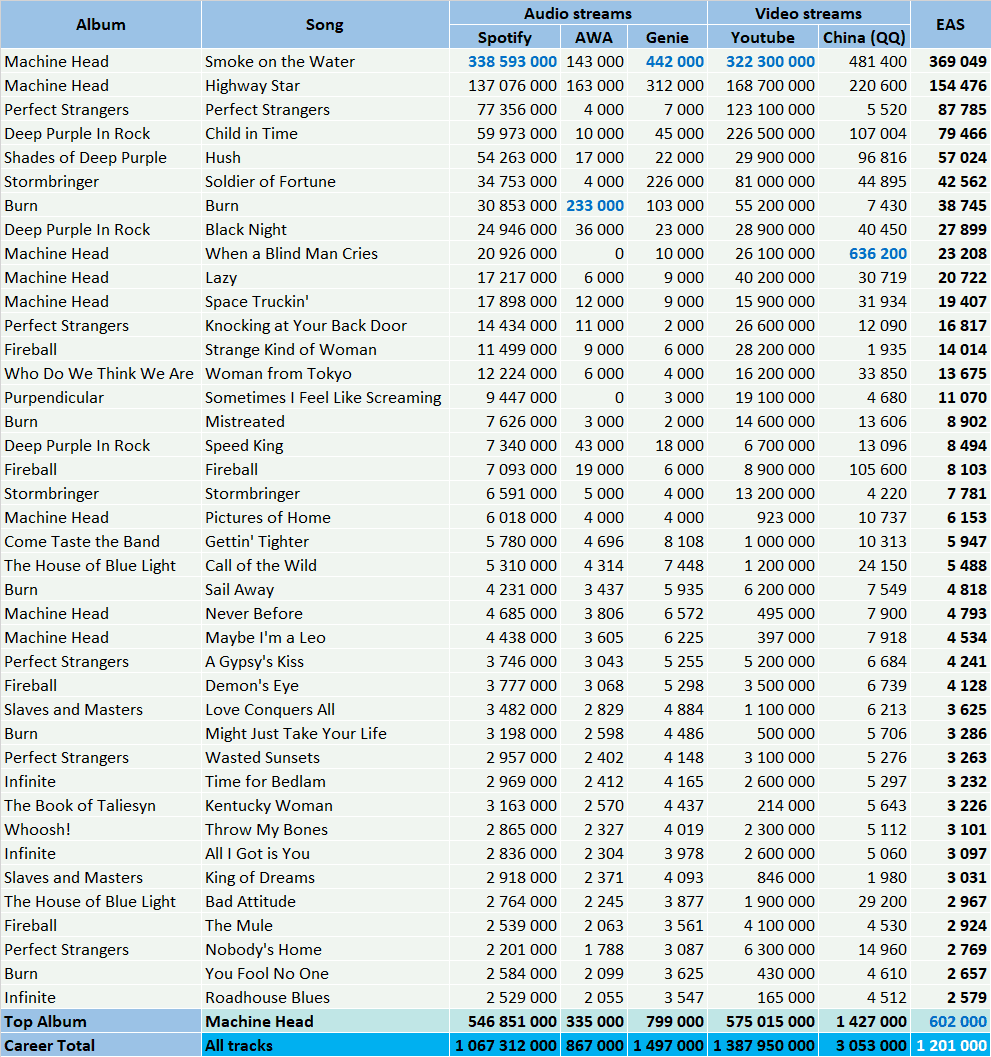
With streams too, it’s no surprise to see Smoke On The Water on top. The song cracks 320 million streams on both Spotify and YouTube. It’s also their leader on South Korean app Genie, fueling the global total to 369,000 EAS.
Interestingly, in Japan the leader is Burn, while When A Blind Man Cries tops Chinese streams.
It goes deeper than this. While at first glance it looks like Smoke is the absolute dominant factor on their discography, YouTube views by country reveal a different story.
This song does dominate the Anglosphere, but in continental Europe and Scandinavia, Child In Time is more often than not the favorite. In terms of global EAS, this song is their 4th at 80,000 EAS.
In Brazil, their top song is their global #3, Perfect Strangers. In the rest of Latin America, the overall runner up Highway Star has the lead.
Maybe even more surprisingly, in many Asian places, where the band is very popular, their main classic is Soldier of Fortune.
This song comes only 6th in their main list, below Hush, which benefits from great US support.
Numbers go down fast, with only 10 songs cracking 20,000 EAS from streams. Their 2020 album Whoosh! can’t benefit from the current market either with a mere 3,000 EAS for its main song Throw My Bones.
Naturally, Machine Head tops the album ranking with 602,000 EAS. It’s just over half their career total of 1.2 million.
Full catalog breakdown
If you are familiar with the artist’s catalog and want to check details of each and every song, you can access to all of them right here.
Keep yourself up to date
Our website provides you a fantastic tool which fetches updated Spotify streams as you request them, use it to watch these results grow day after day!
Deep Purple compilations sales
It sounds fairly logical to add together weighted sales of one era – studio album, physical singles, downloads, streams – to get the full picture of an album’s popularity. For older releases though, they also generate sales of various live, music videos and compilation albums.
All those packaging-only records do not create value, they exploit the value originating from the parent studio album of each of its tracks instead. Inevitably, when such compilations are issued, this downgrades catalog sales of the original LP.
Thus, to perfectly gauge the worth of these releases, we need to re-assign sales proportionally to its contribution of all the compilations which feature its songs. The following table explains this method.
The distribution process

How to understand this table? In the example of Made In Japan, these figures mean it sold 8,895,000 units worldwide. The second statistics column means all versions of all the songs included on this package add for 660,059 equivalent album sales from streams of all types.
The second part on the right of the table shows how many equivalent streams are coming from each original album, plus the share it represents on the overall package.
Thus, streaming figures tell us songs from the Machine Head album are responsible for 85% of the Made In Japan appeal. This means it generated 7,596,000 of its 8,895,000 album sales and so forth for the other records. We then apply this process to all compilations present on below table.
Compilations sales figures listing

Made In Japan is one of the most critically acclaimed live albums of all-time.
Their live shows played an exceptionally important part in them gaining the success and reputation they did. With amazing performances from early on, that highlighted the complex and technical interplay between the members, especially Ritchie Blackmore and Jon Lord.
The huge sales of Made In Japan explain in greatly why Machine Head hasn’t sold even more. Both albums sold at the same time on the back of the same songs, both climbing to 9 million sales.
It was just a start. As of today the band and its members have released more than 100 live albums featuring their songs. An insane total showing how much they have been milking their live appeal.
The same is true with compilations. None sold more than 3.5 million, but tons of them came out through the years. By the end of the 70s, already 20 packages had seen the light.
As a bonus, below is the breakdown of the top selling records.
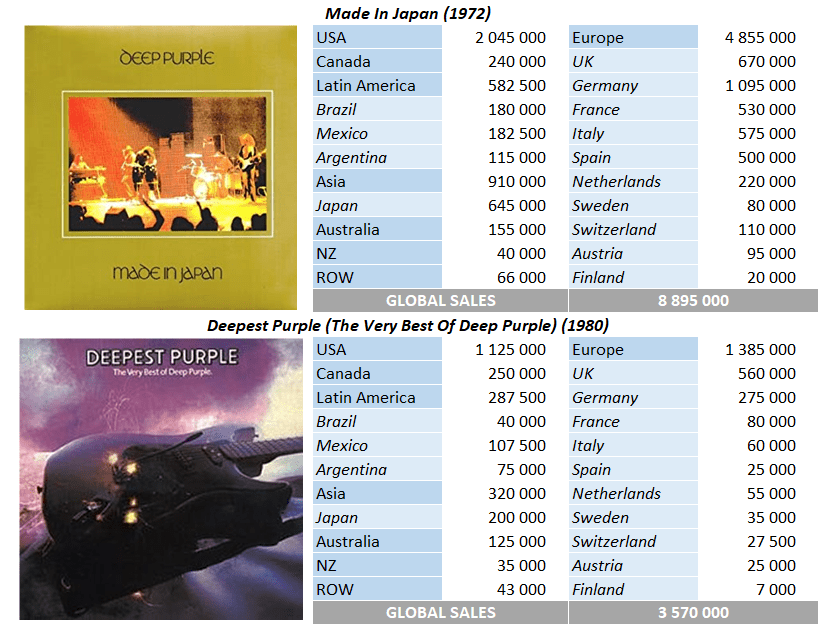
Full Length related records Sales – Summary
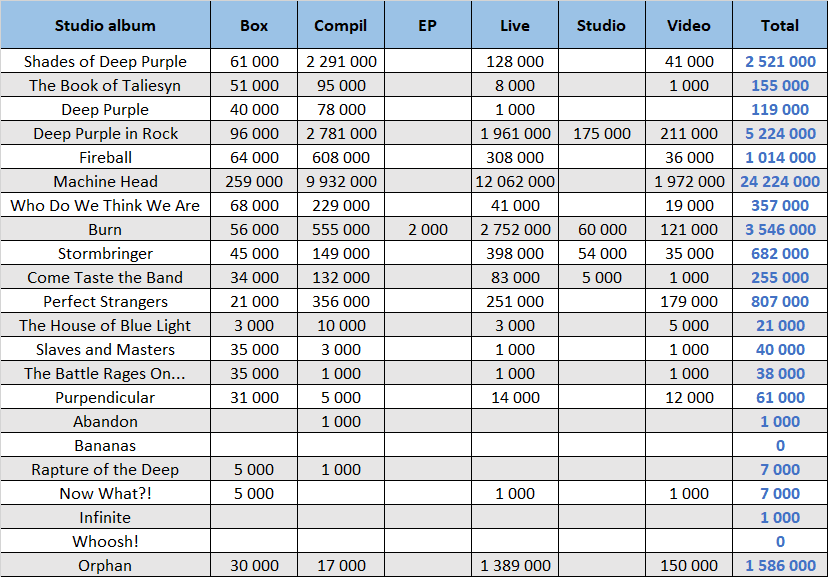
Here is the most underestimated indicator of an album’s success – the amount of compilation sales of all kinds it generated. Due to the dependency of sales of the original studio albums on these releases, they are a key piece of the jigsaw.
These numbers are obtained by applying the method from the section The distribution process to all packages listed under Compilation sales figures listing category.
The result of Machine Head is a shocker: 24.2 million album sales powered by its songs. It includes 12 million live sets and 2 million videos. These are terrific numbers.
Total Album (all types) Sales per Country
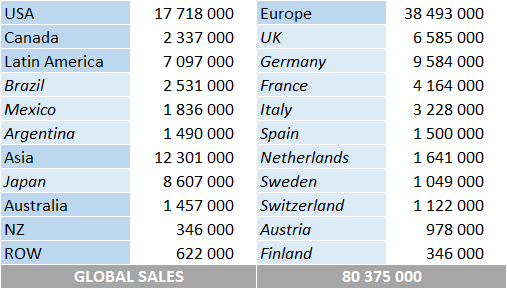
Please note country-specific numbers may miss sales of a few minor releases, although totals are complete.
Deep Purple Career CSPC Results

So, after checking all the figures, how many overall equivalent album sales has each album by Deep Purple achieved? Well, at this point we hardly need to add up all of the figures defined in this article!
Albums CSPC results
In the following results table, all categories display figures in equivalent album sales. If different, pure sales are listed between parentheses.
As a reminder:
- Studio Album: sales of the original album
- Other Releases: sales of compilations generated thanks to the album
- Physical Singles: sales of physical singles from the album (ratio 3/10)
- Download Singles: sales of digital singles from the album (ratio 1,5/10)
- Streaming: equivalent album sales of all the album tracks (ratio 1/1500 for Audio stream and 1/6750 for Video stream)
Artist career totals
See where the artist ranks among remaining singers
While the discography of Deep Purple is solid overall, with no less than 10 multi-million sellers, Machine Head reigns supreme.
The smash LP amasses over 35.2 million equivalent album sales, thanks to its strong impact on the group’s results for nearly 50 years.
It ends up in-between Led Zeppelin‘s IV and Pink Floyd‘s Dark Side of The Moon, the top sellers from 1971 and 1973, respectively, as the biggest album issued in 1972.
In Rock is a distant but great runner up. Its sales are over 12 million units to date.
The extensive usage of its songs by ex-members of the band helps Burn to secure the third spot with nearly 8 million units.
A handful of albums stands at 4-5 million, among them is Shades of Deep Purple thanks to the lasting appeal of Hush.
If nothing is of note in the rest of their discography, they still went on to top a million sales with all their releases until being 25 years into their career.
Once we put everything together, they haven’t sold only 10 million nor 500 million, but instead a very respectable 92.5 million equivalent album sales.
Singles CSPC results
The list is compiled in album equivalent sales generated by each song. Therefore, these figures are not merged units of singles formats. Instead, it includes weighted sales of the song’s physical single, download, ringtone and streaming as well as its share among sales of all albums on which it is featured.
1. 1972 – Deep Purple – Smoke on the Water [Machine Head] – 23,630,000
2. 1972 – Deep Purple – Highway Star [Machine Head] – 8,690,000
3. 1970 – Deep Purple – Child in Time [Deep Purple In Rock] – 7,760,000
4. 1974 – Deep Purple – Burn [Burn] – 4,800,000
5. 1968 – Deep Purple – Hush [Shades of Deep Purple] – 4,470,000
6. 1984 – Deep Purple – Perfect Strangers [Perfect Strangers] – 3,970,000
7. 1970 – Deep Purple – Black Night [Deep Purple In Rock] – 3,120,000
8. 1973 – Deep Purple – Woman from Tokyo [Who Do We Think We Are] – 3,100,000
9. 1974 – Deep Purple – Soldier of Fortune [Stormbringer] – 2,500,000
10. 1971 – Deep Purple – Strange Kind of Woman [Fireball] – 2,360,000
11. 1974 – Deep Purple – Mistreated [Burn] – 1,730,000
12. 1971 – Deep Purple – Fireball [Fireball] – 1,300,000
If you feel inspired by this list, we just created this CSPC Deep Purple playlist on Spotify!
Discography results
Thanks to our new ASR (Artist Success Rating) concept, we know that their sales represent 27.04 million times the purchase of their entire discography. Coupled with their total sales, it translates into an ASR score of 283.
It is similar to the score of artists like David Bowie and Van Halen. The ranking of all artists studied so far is available too at this link.
Records & Achievements
- At 35,249,000 EAS, Machine Head is the most successful album from 1972.
- At 23,630,000 EAS, Smoke On The Water is the most successful song from 1972.
- At 23,630,000 EAS, Smoke On The Water is one of the top 10 most successful songs from the 70s.
- At 23,630,000 EAS, Smoke On The Water is one of the top 25 most successful songs of all-time.
- At 8.6 million pure album sales, Deep Purple are among the best selling foreign artists of all-time in Japan.
- Deep Purple are one of the rare foreign acts to sell over 500,000 with both a single/EP and an album in USSR.
NB: EAS means Equivalent Album Sales.
As usual, feel free to comment and / or ask a question!
Sources: IFPI, Spotify, YouTube, Discogs.
You may be interested in…
… Deep Purple‘s streaming masters analysis
… best-selling artists, albums, and singles
We have created amazing cross-artists tops. Click to see all CSPC and raw sales results compiled so far!
Artists
360° analytics – Best-Selling Artists | by Decade
Tools: Artist Dashboard | Artists Comparator
Streaming deep dive – Most-Streamed Artists
Tools: Playcounts | Royalties | Global Reach | Stats History
Other KPIs – Monthly listeners | Followers | Top money makers
… similar artists
This article is being discussed in our forum, join us to share your comments! »























